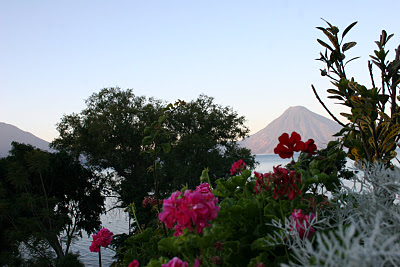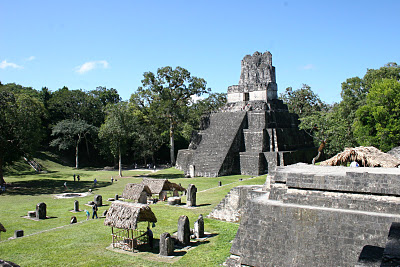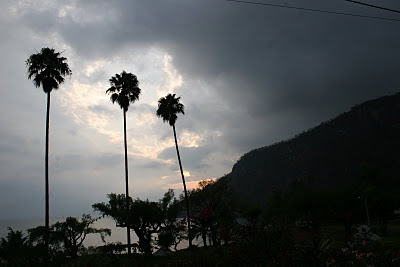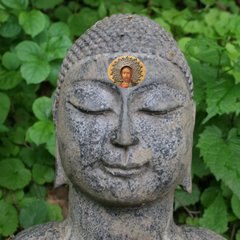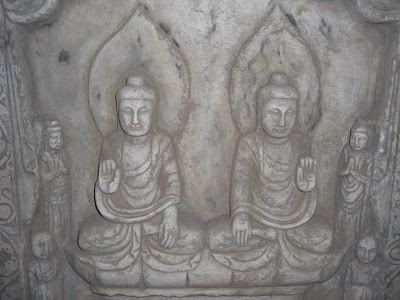 In
my own experience, it's been proven over and over that I work without
knowing at all where it will lead me, in an inner sense.
In
my own experience, it's been proven over and over that I work without
knowing at all where it will lead me, in an inner sense.I find that my spiritual search is always for something beyond myself, beyond what I call "I" and what I experience as my ordinary state. If I was not calling out to something distant, a force that may well be within me, but which I am separated from by a vast landscape of misunderstanding, then how else would I understand it? The fact that this "distant object" (if you'll excuse the concrete metaphor) is an inner quality just makes it more mysterious, in my eyes.
It suggests that within each of us there is a vast landscape to be transversed in order to reach what is "real" within us. That landscape is populated with intense sensations we do not know, deep emotions we have not yet felt, unimaginable visions, tantalizingly sweet yet unfamiliar smells, and mysterious, subtle, and evocative tastes.
Some of Gurdjieff's best music gives us a sense of this search: the sound seems to carry us through an immense and unfathomable desert on a quest for lost integrity. A sensation which is fundamental, what the Germans would call "Ürsprunglich" -- derived directly from the original root of Being--which we have misplaced.
The author of "The Cloud of Unknowing" presents us with a similar search for this fruit that can hardly be tasted. It's also a characteristic feature of Dogen's Zen. What we search for is not what we are, and not even what we can imagine. Even our search itself is not part of what we search for. This reminds me of something Andre Enard told me years ago:
"We must surrender everything... even our wish."
In conducting my search, I try to understand my place. I use the Lord's prayer for that; for me, it seems to clearly establish where I am, that is, on a lower level than the possibilities which are available to me.
This prayer embodies a repeated and distinct appeal for help. It has been part of my sitting practice for many, many years now, and I still do not fathom its depths or clearly discern its meaning. I do know that it represents a vital call for assistance, and this is one of the reasons I use it.
The idea of needing assistance in spiritual work is common to almost every religion. It's true, in the New Age understanding of religious practice, there is an idea afoot (perhaps not totally off base) that we already have everything we need, and everything is up to us. That particular idea is not, however, a significant part of any current Gurdjieff understanding. It also isn't common to Christianity, Islam, or Hinduism. It appears that this attitude of self-sufficiency stems (more than likely) from influences of Buddhist practice.
I think the idea of complete self-sufficiency is a good thing. We might contrast it, however, with the many well-established practices that claim we require help from "higher Beings."
In my own case, I do not believe in higher Beings--entities "above us." For me, this question is an established fact, not a belief ...as some of you may recall, Gurdjieff once told Ouspensky, "there will be facts."
Of course I don't ask anyone else to take it as fact.
In my own case, I can report that understanding this shattered my entire life and left me terribly uncertain about many of the things I used to believe. Apparently most of them are wrong, and some of the things that I was absolutely certain were untrue were established, after the fact, to be absolutely true. It's very difficult to remain philosophical or detached when your world gets turned upside down in such a manner.
Speaking once again of my own practice here. In this context of Beings which are greater than ourselves, I understand that I need help from being of a higher level, and this being may well be personified, that is, it may take the aspect of Christ, or Krishna, or Buddha. Those of you who have read Frank Sinclair's "Without Benefit of Clergy" may recall his Christmas story about Gurdjieff instructing his entourage to call on Christ for help.
I doubt this story was apocryphal or peripheral in any sense. Gurdjieff understood all too well that we are helpless the way we are. If we don't attract the attention and assistance of something above ourselves, we are stranded. And, as he so rightly points out, why would anything higher than us want to be bothered with us in the first place? (It would be the equivalent of us noticing bacteria... something we do, of course, do, but only when we want to exterminate them.)
I think that the only way we will ever be willing to submit in this way and admit our helplessness is in the same way that alcoholics do: admit we are powerless, and come to believe (or even better, know) than a power greater than ourselves can restore us to "sane being-mentation."
An aim of this nature cannot spring from the mind alone. It must be formed of the body, and expressed through the heart.
May your roots find water, and your leaves know sun.

